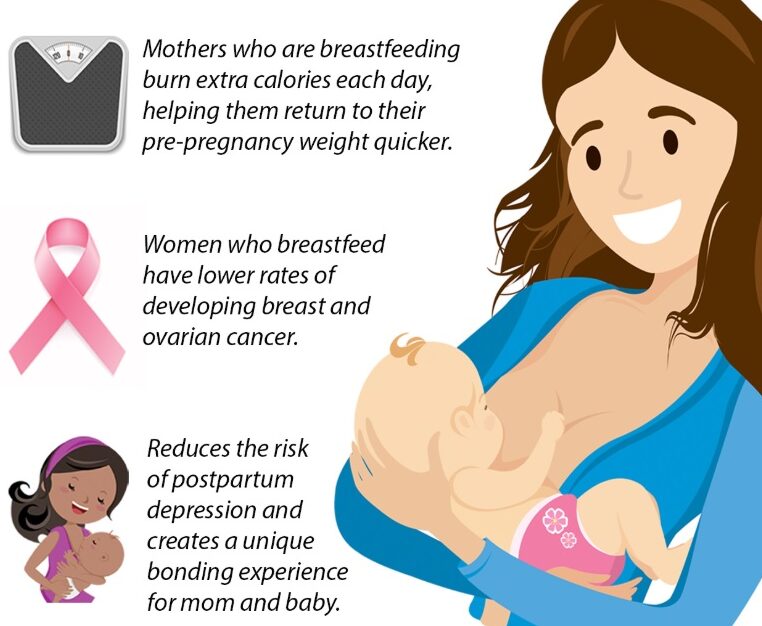In this post, we will talk about breastfeeding in brief and what should you do for 0-6 months infants.
Introduction
Breastfeeding is a process that starts in the first trimester because your body is already creating the glands and the ducts in your breasts that will eventually help you when that baby comes out.
What you also need to do is start preparing emotionally and mentally. Now if you didn’t start in the first trimester you went through the pregnancy and had a baby, you can still start right away. And for that, you often have lactation consultant right in the hospital that can help you through any problems you may have. Also right in the delivery room a lot of the nurses there are trained to know how to teach you in the first hours after the baby is born. So all of these resources you have at your disposal or when you’re in the hospital. Make sure that right away you start using all the resources you can learning as much as you can and getting all the tips that will help you later on.
So be sure to use this lactation consultant in the long term and in the short term. It can save you a lot of anxiety and a lot of needless worrying. This is a great resource to use and especially if they’re they’re part of the medical team in the hospital. Be sure to utilize the opportunity and use them if you can.
Some of the hormonal changes during pregnancy are helping the mother prepare for the breastfeeding process. Two of these changes, for example, one the aerial of the breast will get a lot darker and that will be a visual cue for the baby to make it easier for them to find the nipple, which is the source of the milk for them.
The second way that your body will prepare for the pregnancy is you’ll notice small bumps around the nipple itself. Now, these are mammary glands and they excrete an oily like substance which has a number of jobs. First and foremost it’s an oily like substance that keeps the skin intact and prevents cracking and bleeding when the baby starts breastfeeding. But it also carries a very distinct scent that the baby can pick up. And so this gives the smell which is also a different cue for the baby to know where to get the milk from.
Something interesting is that other mammals which are more hairy than us people they don’t have these mammary glands because the hair on their body is enough to trap the scent and the baby will, therefore, know instinctively how to find the milk.
But in humans who have less hair on their chest, we need those memory glands in order to create a scent and give you a little bit more direction to the baby who’s looking for the milk. So that’s just a fun fact that you can understand.
So now that you know that your body has already been preparing months in advance for the breastfeeding process. You should also join the physical preparation by giving it some emotional as well as mental preparation and being ready when you’re about to start breastfeeding.
Benefits of breastfeeding

There has been a ton of medical research and a lot of statistical work done on this subject and all signs point to amazing benefits and breastfeeding with very few side effects especially in the long term.
Prevents upper respiratory tract infection
Now this includes otitis media which is an ear infection. It includes sinusitis and it also includes bronchitis which are very common infections that babies may get.
So this lowers the chances of the baby getting recurrent infections and it also reduces the chances of them getting lower respiratory tract infections which is pretty much pneumonia.
Now in the long term as far as the baby who grows up to be a child is concerned it reduces their chances of developing asthma later in life as well as obesity and diabetes. Now there has been some work to see if it also reduces the amount of depression or the chances of the child growing up in him experiencing depression late in life. And I will say that the evidence is not completely clear cut on this but all of the other and other evidence points to very beneficial outcomes for breastfeeding.
Lower chances of getting breast cancer
This is for the rest of their life. Lower chances of breast cancer, ovarian cancer as well as obesity and diabetes for the mother. So these are benefits all around that really have no drawbacks in the long term. In the long term because in the short term it can be a little bit tough.
Emotional attachment
One of the emotional benefits they mostly come from skin to skin contact which can be achieved if you don’t breastfeed. So you can feed your baby and give them a lot of skin to skin time. This is really really something beneficial. But when you breastfeed it forces you to have that time quite frequently. So it’s very good for the emotional connection for both the baby and the mother.
Starting to breastfeed

Now the breastfeeding process is something that needs to start right away and be continuous. If you can’t start a few days later because the hormones of your body all create a situation in which right after the birth you’re ready to breastfeed and the baby will be ready to start breastfeeding as well. So it needs to start right away.
And the production of milk also depends on the frequency with which you breastfeed. So really in the delivery room within the first hour, you can try a couple of times to have the baby latch onto the breast and start the sucking process.
One of the things that you want to do right away or it’s very beneficial and I highly recommend it is skin to skin contact right out of the birth canal.
But first of all, imagine the baby who has been completely surrounded by this uterus and in this warm environment completely protected and completely nourished through the umbilical cord for the last nine months. And it has grown and developed humans. We don’t completely finish our development. Obviously, we don’t finish our development inside the womb but even compared to other animals we come out into the world very underdeveloped.
We can say is because humans have very large brains with respect relative to their body. And so in order to have us being able to fit through the birth canal and not having heads that are so big that we caused damage to the woman we end up coming out earlier when we’re underdeveloped.
A number of other animals you might see them come out of the birth canal and immediately start walking. Where humans we have a full year until we can start walking and other basic needs are very very similar.
One of the amazing things is the skin to skin contact is it’s not unique for the mothers. Fathers can also participate in this. Now when a baby comes out originally when they’re born there are a number of reflexes that they are born with naturally. And so one of these reflexes is sucking if you put a finger in their mouth they automatically have this reflex well where they will start sucking on the finger and this is the reflex to allow them to eat.
So right within the first minutes even after being born after they’re cleaned a little bit or given to the mother you can try to have them latch onto the breast and the sucking process, the sucking instinct, will help them get the first drops of the coast of colostrum from the nipple. And so this is this happens instinctively a few minutes after being born. So that’s the first time where you can start trying to breastfeed.
Now there may not be a lactation consultant in the delivery room but the nurses in the midwives who help the birth and give birth actually, those nurses are highly trained in many and most of the situations, they’re highly trained in how to instruct the women to breastfeed that first couple of times. So make sure that you use her guidance and her consultation to help you in the delivery room.
Common challenges of breastfeeding

What happens if the first time breastfeeding doesn’t go very well. Now you might start panicking because this baby who just came out needs to be fed. They need their nourishment. How are they going to grow? And they’re not breastfeeding well.
It’s not going to go well the first time this baby has just come into the world from being completely nurse just like we mentioned completely protected. They are now alone. An individual that they have to fend for themselves. So there’s a lot of adjustment that needs to go on during this first couple of days, weeks, years.
Babies are born with a lot of extra fat on them and they’re meant to survive even though that they won’t get a very solid and efficient and effective feed for the first couple of days even. That doesn’t mean that you don’t keep trying. And even in the first hour if you try a couple of times and you’re managed to get one session that’s relatively “OK” and you think that they’ve got a couple of drops that’s perfect.
Seek lactation help
One of the reasons why stress that you should go seek out lactation consultant is because there’s nothing better than that professional help that can help you one on one in person and see what you’re having problems with if you’re having problems at all.
Another thing that they can do aside from helping you with your problems is to calm you down and let you know that everything is going as planned and as normal. So it’s very important to seek out that lactation consultant even if it’s not your first birth. If this is your second, third, even fourth child and you’ve done this before it is the first time that you’re breastfeeding with this new child. And every child every baby is an individual. They do things individually.
So a lactation consultant or a professional has seen a number of different scenarios in the past. They can help you with this individual situation even though you are unique and maybe something that this lactation consultant has never seen before. I highly recommend that you go seek out a professional that can give you the in-person guidance that you need that will really do a lot and go a long way to helping you if you’re having any problems or if you fear that things aren’t going exactly as you would have liked.
Group lessons
Another thing that I want to recommend for you are support groups. Now it doesn’t have to be like an AA meeting where people are coming to tell their problems rather even if it’s group lessons where women where mothers can come and share their experiences with others because one of the things that really help mothers go through this process is listening and understanding the stories of other with professional guidance.
There’s a number of forums on the Internet for example where these stories can get out of hand and cause more excited than they do help. But the support of peers and other mothers who are going through a similar process at this time is a really valuable tool that you should use if there are any problems.
The first time breastfeeding
Now don’t expect milk to come flowing out right away because this is a process that takes a few days to happen and for the milk to develop it really takes a short amount of time.
The first thing that you’re going to see is a very thick yellow substance called colostrum. Now colostrum is very dense in calories. It’s very dense and fats and your babies only going to need really a few drops in order to get the nourishment that they need for the first few days of life. So don’t sweat it if there are not gallons of milk if you think they’re not drinking enough. They really only need those few drops in the first few days of life. That’s really enough to help them survive and thrive enough to keep going.
Many women worry that the volume of their milk isn’t enough especially at the beginning. So really I just want to stress that. Now one of the amazing things that you can keep in mind during this process is the stomach of a newborn baby is a boat the size of a small grape. It is tiny and you can really fill it up with a few drops. It is enough to fill up the stomach of a newborn baby. So keep that in mind as your baby’s licking up the only few drops that come out that can be enough to fill their stomach.
Within anywhere from two to five days usually, it comes around day three or four depending on a number of factors that will get into a bit. But during around that time, you’re going to feel your breasts getting a little bit larger and heavier and in between eating sessions, you’re going to see them really expand a noticeable amount. So this is the sign that you’re really starting to produce the first amounts of breast milk.
If by day four, day five, you’re not yet experiencing this transition. There’s no reason to panic just yet. However this could be a reason to go seek out the lactation consultant, a nurse, a doctor, and just check with them. So they can do a review of your medical history ask questions to see if there were any complications during the birth or any other reasons.
Now, every woman certainly is different with the amount of time that it takes her to do the transition from the cholesterol to breast milk. There are individual things that can really complicate or having an influence on this process. So some of those things, for example, might be if there was a natural birth or a C-section or the amount of time that the hospital that the woman received I.V. fluids. Underlying illnesses that the woman may have like hypertension, diabetes, Of course, if there was pre-eclampsia as well as thyroid problems and a number of the long list of things.
All of these things can influence the amount of time that it takes for the colostrum to turn into breast milk. So again if it’s taking too long more than four or five days no reason to panic just yet but certainly seek out a consultant if that’s the case.
So just as there is a transition from this colostrum to the breast milk there’s also transition later on in the feeding process between the first amount of milk that comes out and the last amount of milk.
One of the things that you should keep in mind in the future in the first two weeks of breastfeeding is that you want to try staying away from pacifiers or bottles if you can help it. Things that you’re trying to get your baby used to is the connection between their mouth the muscles they need to use and create some kind of muscle memory with their mouth and the breast that you’re trying to get it to latch on to.
Now this baby is learning this muscle memory for a very specific act so they’re using your jaw muscles and their mouth muscles to latch onto the breast. And if you use a pacifier especially in the first few days it can be a little bit confusing for them and changing there and changing the formation of their mouth to match something a little bit different might hinder the process of them learning to latch onto the breast and creating that firm connection where they can really get the most out of the breastfeeding section. So this is true both for the bottle and for the pacifier. You want to try staying away from this. At least for the first time throughout the first two weeks.
Does breastfeeding hurt? Certainly within the first few times especially if this is your first baby and it’s not something that you’ve ever done before. Breastfeeding can be extremely painful for a number of reasons.
Now one of these things is because it can cause cracks in the skin which might even lead to bleeding and it’s an extremely uncomfortable experience although it’s not something I’ve personally experienced it’s certainly something that I have very closely followed and closely observed with people who are close to me.
So if this happens there are a few things that you can do first and foremost lactation consultant is very high up on the list. And the reason why I tell you this is because the number one reason that breastfeeding can be painful is positional problems.
This meaning this meaning that the baby is not properly positioned to the breast and they might not be getting enough of the breast in their mouth if they only get a small amount they create situations in which parts of the skin maybe are exposed that shouldn’t be or the opposite parts of the skin are in the mouth. Feeling a lot of the tension which doesn’t need to be the process. So a lactation consultant or a nurse in the hospital somebody who can help you with the positioning can solve a lot of these problems, really from the core of the issue.
Now I will say that it’s not only positional problems that cause pain. There are a number of conditions but if you get a lactation consultant, for example, they’ll be able to spot these infections and help you work through them or let you know if it’s time to go to the hospital or go see a doctor.
If you have a fever during this process and you’ll see redness or swelling definitely go see a doctor during this process. It might be the start of an infection called mastitis. Mastitis is an infection in the breast. And if and you might need treatment with antibiotics, if you don’t get better with antibiotics than there may be an abscess forming there and you might need further treatment. I’m not going to go too much into the specifics of this infection and what it means.
How do you know if your baby’s getting enough?

This is a great question that a lot of mothers who are breastfeeding have and they want to know because they’re very concerned fearing that they might not be making enough milk. So let’s start by saying that if you’re feeding your baby a bottle it’s much easier because you know exactly, how much they’re eating, when they’re eating, and even if they split up afterward you know that it’s probably excess and it’s not something to worry about. So this is one of the easiest things with feeding from the bottle and it’s a major advantage.
Now if you’re breastfeeding you don’t have the luxury of seeing exactly how many milliliters or how many ounces your baby’s eating. There are a few techniques that you can know how much your baby’s eating that I want to mention. So the first thing that you can do is you can weigh them before and after the feeding session.
A lot of lactation consultants or even nurses have scales that are very accurate. And so if you weigh them the exact same way you can know that for every milliliter that they eat they go up one milligram and you can note with a very good accuracy exactly how many milliliters of milk that they eat in that session.
The disadvantage of this technique is that you need a very high accuracy scale in order to do this or you have to do it at the lactation consultant or nurse’s office. It’s not something that most people do at home.
So that being said what is the best way to know if the baby’s eating enough. And the answer to this question is quite simple. It’s the periodic wings that we know if the baby is increasing in size and developing properly. If they getting bigger during the proper intervals, for example, you’re not going to weigh them every hour but you’re going to go after two weeks to get them weighed after two months. So during these intervals if the baby is increasing in size and increasing the weight properly according to the graph of the WTO or whatever graph we’re using. Then you know that they’re eating enough even if you feel that they’re only getting a few drops each meal if they’re gaining weight properly then they’re eating enough.
How frequently the baby should be eating?
Now for this, the general recommendation is as needed. If you’re breastfeeding you’re going to create a connection with your baby and you’re going to know usually when they cry you’re going to know when they need to eat.
Now in the first few days, it might be very frequently from every hour to every two hours. And this is crazy to breastfeed that much it really is a crazy couple day because there’s no day, there’s no night, and there’s no long periods of sleep and the babies seem like they’re not ever getting enough because they’re almost always crying. That’s what it may seem like to the mothers. So I want to reassure you that this is not the case. And one to two hours for every feeding session is absolutely normal in the first few days.
I also want to reassure you that it doesn’t stay this way for a long period of time. As time goes on and the baby gets bigger and their and their stomach grows they’re going to be able to eat more with each session and they’re going to be able to go longer in between sessions without eating. So it’s very tough at first and you need to prepare yourself both mentally and emotionally along with your partner and your expectations. You need to prepare yourselves for this process but don’t give up easily because within not a lot of time it’s going to pass and the feeding sessions are going to be a little bit more spread out.
Another thing that I want to mention to this point is that the amount that the baby breastfeeds tells the mother how much milk she needs to produce. There’s a beautiful harmony between the infant and the mother which help communicate with each other and tell and tell each other how much each need. So as long as the baby is feeding more frequently and sucking more the mother’s body automatically knows to produce more milk. Throughout this process that’s again an amazing harmony that’s created between the mother and the infant.
Common problems of breastfeeding
Breastfeeding is an ongoing process that needs to start right away and needs to be continuous. The relationship between the baby and the mother which creates this type of harmony in such that the baby tells the mother how much milk they need and the mother’s body reacts to the baby by producing enough milk. So for example, if there is anything that causes separation between the baby and the mother the baby is not there to tell the mother how much milk they need.
So the mother’s body is not producing that amount of milk. And when you regain after the separation when you reattach the balance between the baby and the mother is off. The mother’s body is not used in the amount that the baby needs it may not be providing enough. The baby might get a little bit agitated that’s not getting enough milk that it requires. So all of these things can lead to challenges and problem during the breastfeeding process.
What are the few things that can cause separation between the mother and the baby
First of all any health reasons. Babies that are born and have respiratory problems and require being admitted to the hospital for oxygen support. This is one of the reasons why there may be separation and the mother may not be there to breastfeed during this time. However, with most ambitions mothers are usually able to be at the hospital with the baby and be there so that they can breastfeed during this time.
So basically what you need to understand is any separation for any extended period of time between the baby and the mother an extended period of time if the baby needs to feed every hour within the first few days that separation for more than an hour can cause a situation in which the harmony between the baby and the mother is a little bit different and it’s imbalanced.
Other things that can cause separation depending on which hospital you’re at and how they have the process of breastfeeding there may be a situation in which the mother goes to sleep at night after the birth and the medical team there doesn’t wake up the mother when the baby needs to eat. If the baby’s in a different room rather they just give him a bottle.
So there are hospitals that provide a zero separation policy where the baby can be beside the mother all the way but depending on which hospital you’re at in which ward you choose.
Another situation that can bring problems is if the is born premature. Now in some of these situations, it’s something that you can plan for ahead of time if you know that there’s a C section plan for week 36 for example. And you know that you’re going to have a premature baby.
Sometimes the muscles of the baby aren’t completely developed or aren’t developed enough to breastfeed properly. And so the baby’s not going to be able to tell the mother in a good enough fashion or strong enough the amount of milk to the baby needs. The mother won’t produce enough the baby will again be hungry so this can cause some problems.
So one of the ways that you can get around this if you can plan for it ahead of time is by pumping during this process and by pumping you’re artificially telling your breast and telling your body that the baby needs more. And so your body is going to produce more milk.
Now the other thing that it’s going to be doing by pumping is you’re going to be expressing milk in a bottle and a lot of time premature babies have an easier time eating from bottles than they do from the breast because it requires a little bit less muscle work around their mouth in there and their jaw and their ambition if you will.
When after all that it just doesn’t work
So you want to breastfeed. You’ve tried your hardest. And in spite of everything that you’ve done something’s just not working. Either it’s too painful or your body’s not able to create enough milk or you’re. Your baby is not gaining enough weight. There are endless complications that may create a situation in which you’re not able to breastfeed.
There are some medical conditions which with which also impair the woman’s ability to create enough milk and breastfeed some of these complications during birth might be things like a postpartum hemorrhage or a retained placenta when not the full amount of the placentas as left or a number of other complications that may cause imbalances with the hormonal excretion of the body. The hormones of the body which initiate the lactating process and initiate the body’s ability to start creating the milk.
Any one of these complications might hinder that process or interfere with it in such a way that you’re not able to breastfeed. So again if you have come to this point for whatever reason whether it be a personal choice, medical complication just the connection that hasn’t happened. We’re now going to talk about what you can do and what the other things that that you can do going forward are.
The first thing that I really urge you to do is to exhaust your options use all of your resources and do every everything you can to fix the problems and I say this only if it’s a problem. If this is if you’ve gotten to the point where it’s a decision you need to get back to work or things of that sort. Then it’s not a matter of exhausting your options to see what else you can do especially if it’s not a work from the environment to express milk while you’re there but if there’s some kind of medical complication or you haven’t succeeded in creating that connection and you feel that it’s not going well.
Exhaust your options seek professional consultation with see your doctor your nurse your lactation consultant support groups all of these things that can really really help you overcome almost any challenges that you may be having.
But still after you’ve exhausted your options you’ve gotten to the point where you’re now going to stop breastfeeding and start giving them formula.
One of the things that I want to urge you to do if this is your situation is to not be hard on yourself. I know a lot of women that really get hard on themselves and are very self-critical of the fact that they’re not continuing to breastfeed for whatever reason. If you’ve done everything you can and you really want to breastfeed I really say good for you as much as I’d like to urge you to keep doing whatever you can. There certainly gets a point where the circumstances of life create a situation where you’re not able to breastfeed anymore and don’t get too hard on yourself when you come to this point in time. It’s natural it happens life happens you’re going to get through it and it’s certainly not the end of the world.
This is not a situation to be frowned upon or looked down upon health or feeding a baby with formula and with the bottle is absolutely OK now I just want to point out it doesn’t have to be one or the other.
So if the baby’s not gaining weight properly but you want to continue breastfeeding absolutely you should continue once or twice a day. And you know if you can Tipper and you if you continue breastfeeding later on to the baby’s life after half a year even after a year the baby’s going to be eating a lot of different foods so you can. Breastfeeding is not going to be the only way that they eat. They’re going to have solids on one hand and you still might be able to breast breastfeed once or twice throughout the day. So it’s not exclusive either you breastfeed or you don’t. You can certainly breastfeed a few times a day and give them a bottle all.
Also at night, you can give them one bottle if you want your partner to be involved. This is one of the best ways to support each other at night you take turns sleeping and your partner gives a bottle and then you breastfeed the next time and then you each get a little bit of longer sleep. That certainly helps out throughout the first couple of weeks.



